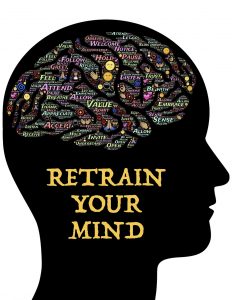How to Create Habits That Stick
Have you ever given up on New Year’s Resolutions? If so, know you’re not the only one. According to U.S. News & World Report, 80% of New Year’s resolutions fail by February. There are several reasons why people tend to give up on their New Year’s promises.
Do resolutions set us up for failure? Should we give up on having resolutions altogether or is there a better way of seeing and embracing new habits? How can we see resolutions in a way that can actually help us achieve our goals?
Most of us consider the beginning of the year as an opportunity to reflect on habits that no longer serve. We try to replace them with healthier habits, positive ways of thinking and better relationship dynamics. We all agree that New Year Resolutions are actually beneficial for improving the overall quality of our lives. But by the end of January, we lose the resolve to stick to our resolutions.
Why do New Year resolutions fail?
The step that differentiates those who stick to their resolutions versus those who give up is creating the right expectations about change. People who quit soon start off with the belief that change will occur overnight. The moment we become aware that creating new habits takes time is the moment we release perfectionism and understand that when it comes to creating change, simply setting the intention is not enough. Patience, consistency and repetition are the tools that create lasting change.
According to a 2009 study published in the European Journal of Social Psychology, it takes 18 to 254 days for a person to form a new habit. This study also concluded that, on average, it takes 66 days for a new behaviour to become automatic. Thus, we cannot expect overnight change. But we can set the right expectations, which will make us less likely to give up.
Read on to understand how a habit is formed and how you can break an old habit so you can keep your New Year’s resolutions.
The psychology of forming habits
According to a 2012 study Trusted Source published in the British Journal of General Practice, habits are
actions that are triggered automatically in response to contextual cues that have been associated with their performance.
Our subconscious mind runs our actions around 95% of the time, being in charge of all the activities that have become habitual. That means that around 95% of the time we do things automatically, without putting too much thought into them. Those are our habits.
 How can we break a habit?
How can we break a habit?
First step – Awareness
Mindfulness is shown to be quite effective when we talk about change. By bringing awareness towards the present and looking at our actions as an observer, we can see what does not serve us and decide to do things differently. Mindfulness is effective in helping smokers reduce cigarette consumption. Researchers found that participants who used a mindfulness app for a month reduced their self-reported daily cigarette consumption by 11 cigarettes per day on average. The NCI app users also reduced cigarette consumption by 9 cigarettes per day on average.
Second step – Acceptance
When we choose self-love and self-compassion towards how we are in the present moment instead of self-loathing, we are less likely to sabotage ourselves and get in our own way.
Only when we fully accept our unloved parts, we are able to create long-lasting change from a healthy place. Otherwise, we are just running away from embracing ourselves as we truly are – flaws and all. Accepting ourselves with both our shadow and light is crucial in moving towards releasing what no longer serves us and allow ourselves to not get it right all the time.
Third step – Action
The last step towards changing a habit is to take consistent action. Our subconscious mind learns new habits by repetition, so the longer we practise a new habit, the more familiar we are going to make it.
 How to overcome resistance
How to overcome resistance
It’s important to know that, initially, we will most probably feel a lot of resistance towards practising the new habits. Our subconscious mind likes the familiar, so anything new will feel unfamiliar. Change can feel uncomfortable and our mind will try to convince us that we don’t really need change.
The way we can overcome this resistance is by having a strong motivation for our new habit. Let’s say, for example, that we want to release the habit of eating unhealthy. Without strong motivation, eating unhealthy food will be the easy option and the most rewarding one short term. But if we connect the motivation of eating healthy with the fact that we want to be able to have more energy to create a purposeful life, we might be more willing to stick to the new habit.
To create a new habit, we have to persuade ourselves that the long-term reward as the more fulfilling one than the short-term reward. Journaling is a powerful tool to help us gain awareness of our old patterns and the new habits we would like to adopt in our life.
Start by writing down the answer to the following questions:
- What behaviour/thinking pattern is no longer serving me?
- What could I do differently to create a new reality?
- How would the person living the life of my dreams act and think?
- What do I need to release/create to embody that?
Once you have the answers to these questions, find your strong motivation.
Don’t forget, be gentle with yourself during the process, even though you are not where you would like to be. Remember that we are human and we will have days when where will not feel like practising our new habit. And that’s perfectly OK. In time, consistency wins over perfectionism.
Find the balance between being gentle with yourself and allowing your inner authority to show up and you will be able to show up for yourself over and over again.
Psychologists at the Centre for Emotion Focused Practice

Lara Ryan
Child, Adolescent & Adult Psychologist
I am a registered psychologist that works with individuals of all ages to really get to the heart of what it is they want and need to live a full life.

Virginia Henningsen
Registered Psychologist
I assist individuals in developing skills to manage their lives, gain enjoyment from their life, and lift and bolster their general feeling of well-being.

Lyn O’Grady
Child, Adolescent & Adult Psychologist
As a Registered Community Psychologist, I have worked with parents in community settings for approximately 10 years as well as with children and young people in school settings for 10 years.

Susanne Goldie
Psychologist
I work with a wide range of individuals in a non-judgemental, holistic way to understand each person’s unique circumstances and support them in achieving their goals. I work with people of all ages.

Hannah Lethbridge
Registered Psychologist
I provide a warm environment for clients to express their thoughts, feelings, and struggles in a safe way. My clients value the collaborative approach I take when we work towards their therapeutic goals.

Geoff Newbegin
Counselling Psychologist & Psychotherapist
I am an experienced counsellor and psychologist with over 15 years of experience, which includes a wide range of clinical experience.

Lucas Silva-Myles
Registered Psychologist
My therapeutic approach is firstly to hear your story and understand what you are going through without judgement.

Hannah Kroussoratsky
Counsellor
Gentle, caring and encouraging, my desire is to truly hear your story and create a safe space for you to grow and flourish. I have a genuine commitment to your whole self – body, mind, heart and spirit – and my integrated therapeutic approach allows for your holistic care and transformation.
If you are looking for help, whether for yourself or a loved one, the psychologists at the centre can assist in exploring underlying issues through therapy. Please visit the practitioners’ page to find out more, or call (03) 9820-5577 for an appointment or to make enquiries.
Related articles
- Mindfulness in Therapy
- Mindfulness in the Workplace
- How can we build resilience?
- Dealing with Stress



